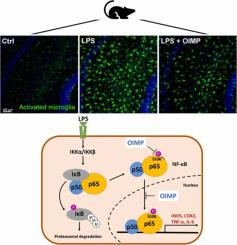当前位置:
X-MOL 学术
›
Biomed. Pharmacother.
›
论文详情
Our official English website, www.x-mol.net, welcomes your
feedback! (Note: you will need to create a separate account there.)
Oxyimperatorin attenuates LPS-induced microglial activation in vitro and in vivo via suppressing NF-κB p65 signaling
Biomedicine & Pharmacotherapy ( IF 6.9 ) Pub Date : 2024-03-06 , DOI: 10.1016/j.biopha.2024.116379 Changcheng Lu 1 , Chen Huang 2 , Shuhui Qu 1 , Huiyuan Lin 1 , Hai-Jing Zhong 3 , Cheong-Meng Chong 1
Biomedicine & Pharmacotherapy ( IF 6.9 ) Pub Date : 2024-03-06 , DOI: 10.1016/j.biopha.2024.116379 Changcheng Lu 1 , Chen Huang 2 , Shuhui Qu 1 , Huiyuan Lin 1 , Hai-Jing Zhong 3 , Cheong-Meng Chong 1
Affiliation

|
Microglia-mediated neuroinflammation is an important pathological feature in many neurological diseases; thus, suppressing microglial activation is considered a possible therapeutic strategy for reducing neuronal damage. Oxyimperatorin (OIMP) is a member of furanocoumarin, isolated from the medicinal herb Glehnia littoralis . However, it is unknown whether OIMP can suppress the neuroinflammation.
中文翻译:

Oxyimperatorin 通过抑制 NF-κB p65 信号传导在体外和体内减弱 LPS 诱导的小胶质细胞活化
小胶质细胞介导的神经炎症是许多神经系统疾病的重要病理特征;因此,抑制小胶质细胞活化被认为是减少神经元损伤的一种可能的治疗策略。Oxyimperatorin (OIMP) 是呋喃香豆素的一员,从草药 Glehnia littoralis 中分离出来。然而,尚不清楚 OIMP 是否可以抑制神经炎症。
更新日期:2024-03-06
中文翻译:

Oxyimperatorin 通过抑制 NF-κB p65 信号传导在体外和体内减弱 LPS 诱导的小胶质细胞活化
小胶质细胞介导的神经炎症是许多神经系统疾病的重要病理特征;因此,抑制小胶质细胞活化被认为是减少神经元损伤的一种可能的治疗策略。Oxyimperatorin (OIMP) 是呋喃香豆素的一员,从草药 Glehnia littoralis 中分离出来。然而,尚不清楚 OIMP 是否可以抑制神经炎症。






























 京公网安备 11010802027423号
京公网安备 11010802027423号